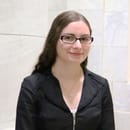Nowadays, colleges and universities are making it easier than ever for students to double-major and still graduate on-time, or at the very least by the end of five years. Still, some students have enough to handle with just one major, maybe tacking on a minor if they have the time. Lili Zigo, a second-semester senior at American University, is not one of these students. She is currently working towards completion of a double-major in public health and psychology alongside a minor and certificate in the prestigious College of Arts and Sciences Leadership and Ethical Development Program (CAS LEAD). If this sounds like a lot, you should see her list of extracurriculars—with Zigo, a common stereotype that AU students do just about everything seems to hold true. Which is why it should come as no surprise that she was awarded one of the prestigious Killam Fellowships this past year.
The Office of Merit Awards has had an eye on Zigo since her sophomore year when she was entered into their Early Identification Program. At her advising appointment, she learned about the Killam Fellowship, a program through Fullbright Canada that selects approximately 15-20 high-achieving American undergraduates each year to study abroad at a Canadian university for either one semester or a full year.
One of the main goals of the program is to discover bright minds within each country and foster academic exchange. The selection process is highly competitive and begins early on in the school year, so you have to be prepared to work for it if you want to get in. The first step, if you opt for direct exchange like Zigo did, is to secure a nomination from your home university. Typically, this begins in September, and the final competition materials are due January 31st for all applicants.
If you’re not sure how to get started, Zigo advises writing about why you want to study in Canada, specifically. Her own “pitch” was that health is not limited to one country; diseases cross borders, so there must be bilateral communication between countries when combating shared public health issues. You should really think about what you want to research and how the Killam Fellowship will help you reach your long-term goals. Don’t apply just for the stipend; apply because this program will help you get to where you want to be.
Speaking of stipends, Zigo also spoke about some of the perks of the fellowship. Alongside credit towards her public health degree, Zigo also received the opportunity to conduct research while studying at the University of Toronto. Through one of her classes concerning aging and health, she looked at the effect of tropical cyclones on senior citizen’s mental health. I don’t know about you, but I would have never thought of that one. If you would have, definitely consider applying!
Another perk to the program was the fact that at the University of Toronto, Zigo was the only American exchange student that semester. You see, the fellows attend different universities across Canada, with no more than two or three attending the same one at a given time, so if you’re looking for cohort living the program may not be for you. But she was not left completely alone; Zigo still made American connections in the area through the program while making friends in her classes. Apparently, the stereotype of the friendly Canadian held true. Still, she got used to going to museums alone.
Pro tip: if you find yourself in the area, Tuesdays at the Royal Ontario Museum are free for students, and Wednesday nights are free at the Art Gallery of Ontario.
Additionally, fellows participate in fall and spring orientations. For the fall orientation, all the Fall 2017 fellows met in Ottawa, and this spring the Canadian and American fellows will meet once again in Washington, DC.
Above all, Zigo’s favorite academic experience was listening to a North Korean refuge speak about her work in a year-long Canadian fellowship. Through this fellowship, she has spent time advising the Canadian government on how to navigate political interactions with her home country, serving as a reminder that North Koreans are regular people who should not be judged by the actions of their leader. She wants to be seen as a survivor, not a victim, a sentiment Zigo found particularly powerful.
The program also funds a cultural exchange, which was Zigo’s favorite “fun” experience. During reading week, Zigo spent time as a tourist in Montreal, going to all of the museums and trying as much food as possible. There was so much to do, and the old charm of the city made Zigo feel as if she had been transported back in time. She definitely recommends checking out the city if you get the chance, Killam Fellow or not.
The biggest takeaway: Canadian schools value learning over grades.
To Zigo’s surprise, she found that her professors only required an 80% in the course if she wanted to get an “A.” And low and behold, the curve of the classes was typically a “C” average, something Americans just aren’t used to, with few exceptions. Zigo found that she no longer had to be perfect, although that did not mean she could slack off; this new grading system only meant that the professors had higher expectations. Coming back to America was a major re-adjustment this semester; seeing that “95% = A” on her syllabus brought back the pressure fairly quickly. At least they grade more leniently in the US.
All in all, it was an experience Zigo will never forget, and she recommends it to anyone interested in public health and research. The next application cycle begins this fall, so start planning now. The official website can be accessed here.
(All photographs belong to Lili Zigo)


